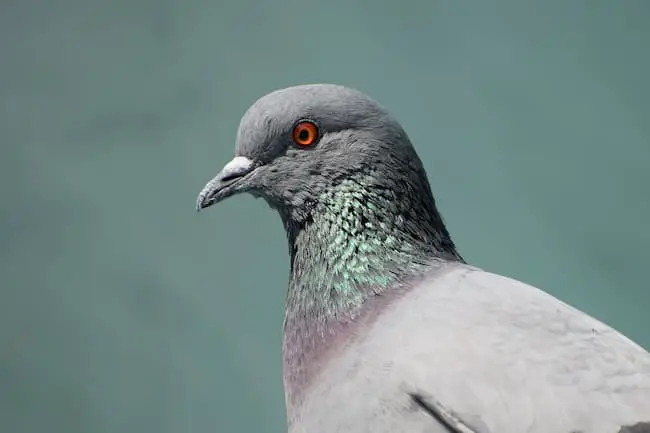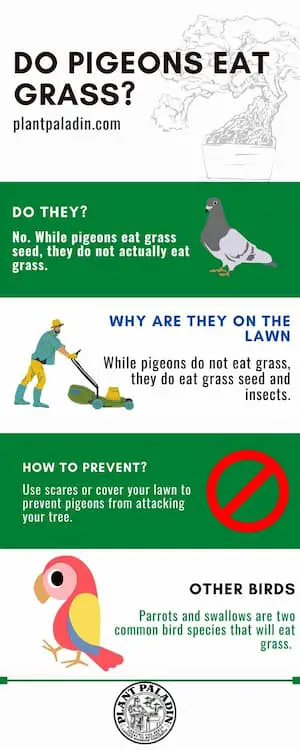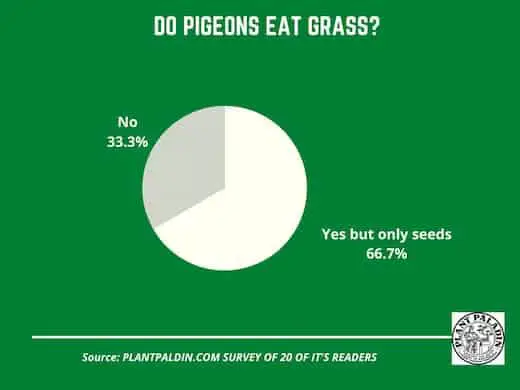This website is supported by its readers. If you click one of my links I may earn a commission. I am also a participant in the Amazon affiliates program and I will also earn a commission from qualified purchases.

As we get deeper into the summer months, I’m mowing my lawn every two weeks. One of the major problems of doing this, however the number of pigeons that peck and damage my lawn. This got me thinking, do pigeons eat grass?
Pigeons do not typically eat grass. If you see pigeons picking at your lawns, they are eating grass seeds, grains, or tiny insects and invertebrates.
So does a particular species of pigeon tend to eat your lawn seed? And how do you keep pigeons away from your lawn? Keep reading to find out more!
Do pigeons eat grass?
To get to the bottom of if pigeons eat grass, I contacted my local gardener, visited my local botanical gardens, and even touched base with 20 plant paladin readers.
All to ensure you had the most detailed post on do pigeons eat grass.
To summarise:
- Pigeons do not eat grass, and as such, they will leave the blades of individual grass untouched.
- Pigeons do, however, eat grass seed and other common grains found in grass and so will pick at grass lawns to get to these foods.
- These birds are not picky eaters, consuming grains, seeds, fruit, berries, and root vegetables, but also, on rare occasions, small insects, arachnids, and invertebrates such as slugs and snails.
- As such, if you find pigeons picking and damaging your lawn, they are looking for these food groups and will happily dig up your lawn in the process.
- This is especially common if you have just mowed your lawn, causing fruit and insects to spread all over your lawn.
- Alternatively, if you have just planted new lawn seeds, you can expect not just pigeons but all birds to descend on your lawn and pick up as many seeds as possible.
- To prevent this, use scares or pesticides to keep pigeons away from your lawn.
Now this is quite a lot of information to take in, so let’s break this down in more detail:

Why do pigeons eat grass seed?
The biggest reason that pigeons will eat grass and lawn seed is that it is a viable food source for them.
Pigeons are not picky eaters and will obtain a free meal wherever they can find them.
As such, because garden/backyard lawns are so widespread in rural areas and suburbs, pigeons commonly dig up lawns for this free food source.
On top of this, if your backyard is full of other plants and fruits such as berry or apple trees, this will also attract pigeons to your garden, seeing it almost as an all-you-can-eat buffet.
Why can’t pigeons eat grass?
So while pigeons don’t eat grass, what is the reason why?
After all, with a food source as widespread as grass, let alone grass lawns, why don’t they eat it?
In reality, if you look at the animals that typically eat grass, be it cows, sheep, or goats, grass must be broken down by chewing before being ingested.
This is because of the fibrous, tough nature that grass has.
As pigeons have beaks, they cannot chew down the grass into cud before consuming it.
Pigeons instead consume their food whole, making food items like berries, small fruits, and, importantly for us, grass seeds easy to consume.
What happens if pigeons eat grass
So now we know that pigeons don’t eat grass (unless you have a persistent pigeon). What happens if pigeons do eat grass? Will it impact their health?
If a pigeon eats a small amount of grass, it is generally not harmful and is considered a regular part of its diet.
Pigeons are omnivorous and opportunistic feeders, meaning they can eat various foods, including seeds, grains, fruits, and even small insects. In the wild, pigeons may consume some vegetation as part of their foraging behavior.
However, pigeons are primarily granivores, so their diet is mainly based on seeds and grains.
Grass does not provide them with the ideal nutrition they need, so they do not actively seek it as a primary food source. Suppose a pigeon ingests a large amount of grass or other vegetation. In that case, it may cause digestive issues, as its digestive system is not well-adapted to break down rigid plant material.
Generally, if a pigeon occasionally nibbles on some grass, it should not cause significant problems.
However, suppose you notice a pigeon regularly eating large quantities of grass or showing signs of distress. In that case, it’s best to consult a veterinarian or an avian specialist to ensure their health and well-being.
How to stop pigeons from picking at your lawn?
So I do not doubt that most of you are reading this post as you are sick of birds picking at your lawn.
The good news is that you can do a few things to prevent this going forward.
These include:
Scare Tactics
Scares can be an excellent way to prevent pigeons from coming anywhere near your lawn.
This can include:
- Reflective Objects: Hang old CDs or aluminum foil strips around the lawn. Light hitting these objects creates flashes and reflections that can scare pigeons away.
- Scarecrows: Set up scarecrows or other life-sized, human-like figures on your lawn. Pigeons are wary of potential threats and may avoid areas with these scare tactics.
- Motion-Activated Sprinkler System: Install a motion-activated sprinkler system that turns on when pigeons approach. The sudden burst of water will surprise them and make them think twice about returning.
Physical Barriers:
Another way I have found to stop pigeons from picking at my lawn is to erect a physical barrier between my lawn and the bird.
This can include the following:
- Netting: Cover areas where pigeons are picking with bird netting. Netting is an effective barrier that prevents pigeons from accessing the lawn and picking at the grass or plants.
- Spikes: Install bird spikes on ledges, railings, or other flat surfaces where pigeons might perch. This prevents them from comfortably landing and accessing the lawn.
Repellents
- Bird Repellent Sprays: Use bird repellent sprays that emit an odor pigeons find unpleasant. Apply the repellent according to the manufacturer’s instructions on the affected areas.
- Granular Repellents: Scatter granules with bird-repellent properties around the lawn. These can have strong smells that deter pigeons from picking.
Remove Attractants
Regularly clean your lawn to remove birdseed, fruits, or food scraps that might attract pigeons. Ensure trash bins are correctly closed and don’t offer easy access to food.
Motion-Activated Devices
Invest in motion-activated sound devices that emit distress calls of birds or predator calls. Pigeons perceive these sounds as threats and will likely avoid the area.
Garden Decorations
Place fake owls, hawks, or predatory bird decoys on your lawn. The presence of these decoys can create a sense of danger for pigeons and deter them from picking.
Sound Deterrents
Use sound repellents that produce noises or distress calls that pigeons find irritating. These sounds can discourage pigeons from foraging in the area.
Maintain Lawn Height
Keep your lawn well-maintained and trim it regularly. Short grass is less attractive to pigeons for nesting and foraging.
What types of pigeons eat grass?
All pigeon sub-species will eat grass seed if they come across it. tRock pigeons, Wood pigeons, and Eurasian collared doves will consume and actively seek out grass seed.
When do pigeons eat grass seed?
The most common time of year to see pigeons eating grass seed is spring and summer. Most gardens will re-seed their lawns in the spring for healthy and new grass growth. It is common to see pigeons digging up lawns at this time of year.
It’s common to spot pigeons and birds picking at lawns after rainfall.
This is because often small insects and invertebrates such as worms will rise to the surface, making them easy to pick at
Why are there pigeons on my lawn?
The most common reason for pigeons on your lawn is for food. If your lawn contains a lot of grass or seed, they will actively rest on your lawn.
Pigeons commonly rest in and around your lawn if they enjoy nesting or roosting nearby; consider it a mini park for pigeons.
Finally, pigeons may also want to stay nearby if they are close to other food sources, such as fruit trees or bird seed feeders.
If this is the case, this will be the reason for the additional pigeon footfall near you.
What birds eat grass?
Parrots, sparrows, finishes, and parakeets are all birds that commonly eat your lawn’s grass blades. This is particularly common when the grass has been freshly mowed or re-seeded.
Survey results on do pigeons eat grass
Finally, I wanted to ask 20 plant paladin readers who have lawns if pigeons eat grass.
You can find the results below:

My top picks for the gear you will need!
So like I mentioned earlier, over the past three years of running PlantPaladin, hundreds of people have asked me for my recommendations on the best bonsai gear on the market.
Having spent thousands of dollars on bonsai items these past few years and tested at least 100 bonsai-specific products, I’ve listed my favorite products below – All of which I highly recommend and think you can get great value.
They can purchase directly by clicking the link to take them to Amazon.
Bonsai Tool Set: One of the significant challenges I’ve had is finding a toolset that was not only durable but didn’t break the bank. SOLIGT has recently developed a fantastic bonsai tool set that covers all the tools you need to trim, prune, and repot your trees. – You can grab it here.
Complete Bonsai Set: Many of you will want to grow your bonsai trees entirely from scratch, but finding the varicose seeds, pots, and other items in one place can be challenging. Leaves and Sole then have created a complete bonsai set that I’ve personally used that ticks all the boxes. You can grab it here.
Bonsai wire: The number of times I’ve run out of wire for my bonsai or purchased cheap bonsai wire that doesn’t do the job is embarrassing for me to admit. After a lot of trial and error, I found that using Hotop’s aluminum bonsai wire is one of the best options on the market. This can easily be used for both indoor and outdoor bonsai. You can grab it here.
